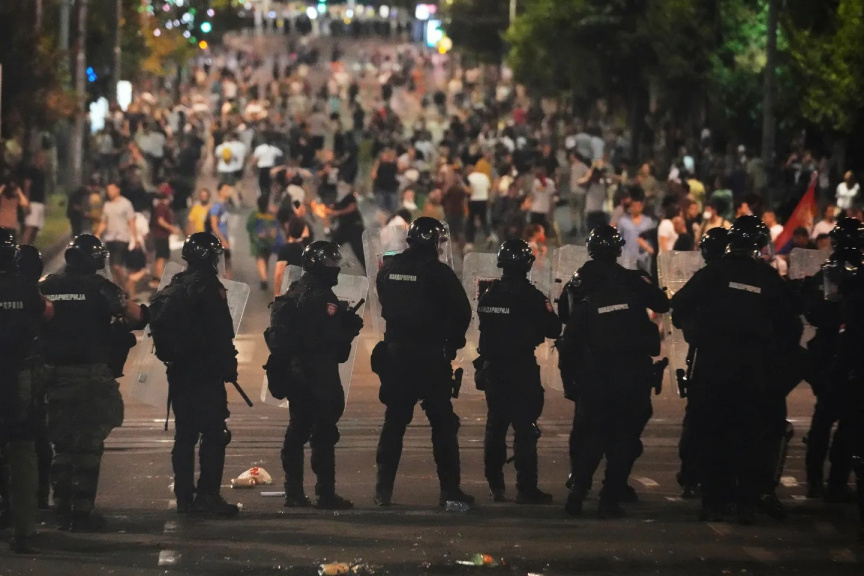
At least five police officers were injured on Thursday evening, and 14 anti-government protesters were arrested, the Interior Ministry said. (Photo/AP)
Clashes between rival groups of protesters in Serbia flared again, police said, as months of anti-government demonstrations boiled over into street violence this week.
A wave of anti-corruption protests has gripped Serbia since November, when the collapse of the Novi Sad railway station roof killed 16 people, a disaster widely blamed on entrenched corruption.
Anti-graft protesters gathered again in several cities across Serbia late on Thursday.
That was mainly in response to a previous attack by governing party supporters on demonstrators on Tuesday in the town of Vrbas, about 160 kilometres north of the capital Belgrade.
Large groups of pro-government supporters, most wearing masks, confronted protesters on Wednesday, and the two groups hurled bottles, stones and fireworks at each other.
Police had arrested nearly 50 people across the country on Wednesday, and around 30 riot police were injured.
On Thursday, protestors vandalised the Novi Sad headquarters of the ruling Serbian Progressive Party (SNS) and two other SNS offices in the city, RTS television reported, during protests spread across Serbia.
In the capital, Belgrade, protestors massed in front of government buildings and the army headquarters, before heading toward nearby SNS offices.
But a heavy riot police deployment kept them from reaching the offices using teargas.
"These are no longer peaceful student protests but people who want to provoke violence... This is an attack on the state," Interior Minister Ivica Dacic told a news conference.
At least five police officers were injured on Thursday evening, and 14 protesters were arrested, the ministry said.
'Intensifying crackdown'
Frustrated with government inaction, protesters have demanded an investigation into the Novi Sad tragedy and piled pressure on right-wing President Aleksandar Vucic to call early elections.
Over the past nine months, thousands of mostly peaceful, student-led demonstrations have been held, some attracting hundreds of thousands.
But this week's violence marks a significant escalation and indicates the increasing strain on Vucic's populist government, in power for 13 years.
Since June 28, when around 140,000 demonstrators gathered in Belgrade, the government has responded with an "intensifying crackdown" on activists, according to a statement by UN human rights experts released earlier this month.
Protesters and those linked to the movement have faced a "troubling pattern of repression" including excessive police force, intimidation and arbitrary arrest, the experts said.
Vucic has remained defiant, repeatedly rejecting calls for early elections and denouncing the demonstrations as part of a foreign plot to overthrow him.
Student protesters have accused the police of protecting pro-government supporters while doing little to stop the attacks on their own gatherings.
"The authorities tried to provoke a civil war last night," the students wrote on their official Instagram page.
Vucic, who had visited pro-government encampments overnight on Wednesday, denied his supporters had started the violence.
"No one attacked them anywhere," he said of the anti-government protesters, speaking at a late-night press conference.
"They went everywhere to attack those who think differently," he added.
While the protests have so far led to the resignation of the prime minister and the collapse of his cabinet, Vucic remains at the helm of a reshuffled government.
____
Source: TRT